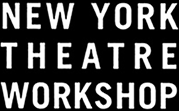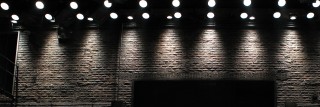
I remember with clarity the first show I saw in the bricks of New York Theatre Workshop: Kia Corthron’s Light Raise the Roof, directed by Michael John Garcés, nearly two decades ago. Set in abandoned subway stations in NYC where people struggle to survive a freezing winter, the show both emotionally and physically transported me into the lives of otherwise invisible others, people living on the edge of terrifying vulnerabilities. It served as a passport to bring me to another world, and two hours later I emerged better prepared to serve the world where we live. That show prompted me to get involved with advocacy for people who are unhoused, and to this day, I can’t pass a darkened subway stop without thinking of that show and what must still be done to fight food and housing insecurity.
Theatre’s true superpower is its capacity for transformation.
Now, twenty years later, I have taken on the role of Artistic Director, excited but humbled in knowing just how much power theatre has. Over the last several months, members of our community have called on the Workshop to take certain positions and make certain statements in response to the events unfolding in Israel and Palestine. We have wrestled with questions about how we can best fulfill our role as a civic institution and how we can best manifest our artistic mission.
As a theatre, we make embodied statements through the artists we support, the work we produce, and the audiences we invite. Great art encourages and amplifies understanding—and, in turn, moves us toward a more just world. For that art to exist, there must be a space that itself maximizes the artist’s creative liberty. We are dedicated to creating and offering that space, giving over our stage to a wide array of artists that challenge our beliefs and—through their art—pose the kinds of questions that urge us to embrace transformation.
Those interested in investing attention to these often hard conversations can participate directly with us, not only through the extraordinary shows we’re producing this season, but through the range of workshops and engagement opportunities for artists and audiences brimming with timely explorations and opportunities for conversation. That includes support for Palestinian artists and companies with whom we have long-term relationships.
We live in a time defined by devastation and division, where neighbors can so easily become enemies. There is always more work to do.
NYTW serves a vital role in providing a civic space to gather together to consider and contend with the deepest challenges and most glorious potentials of the human condition.
As one of my favorite dramatists, Tennessee Williams, once said, “The world is violent and mercurial—it will have its way with you. We are saved only by love—love for each other and the love that we pour into the art we feel compelled to share: being a parent; being a writer; being a painter; being a friend. We live in a perpetually burning building, and what we must save from it, all the time, is love.”
As a theatre, the most impactful statement we make is to empower visionary artists doing the deep work of challenging our assumptions, expanding our understanding, and reviving conversation in the body politic. Theatre is a rare civic space that does more than affirm; it transforms. The work we produce helps individuals and collectives build empathy and catalyze the liberation and love that is possible.
Patricia

 My Cart
My Cart My Account
My Account Gift Certificates
Gift Certificates Find Us
Find Us




